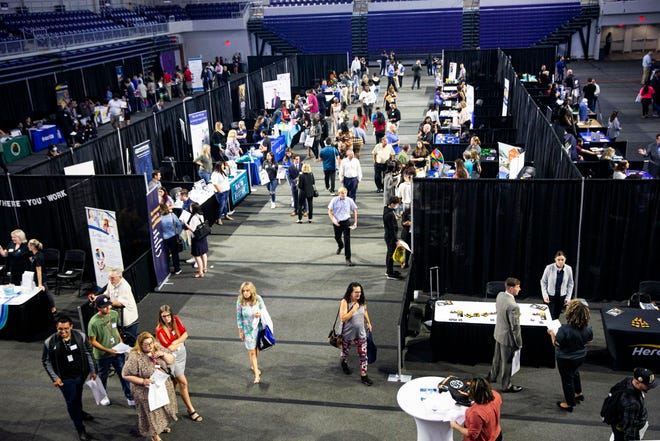FGCU, FutureMakers awarded $23 million grant to offer training to untapped workforce
FutureMakers Coalition and Florida Gulf Coast University received $23 million grant to offer training to untapped workforce
 Erica Van Buren
Erica Van Buren
The FutureMakers Coalition and Florida Gulf Coast University are united in an effort to help connect workers with the necessary training to attain better careers while meeting the workforce needs of employers.
“FutureMakers is a sub-awardee of the $22.9 million grant,” said Tessa LeSage, FutureMakers Coalition Director at Collaboratory. “We are leveraging our more than 140 cross-sector partners to help increase the number of people that have the credentials needed to get into one of the four sectors that the pipeline is addressing.”
What industries need workers?
The four target industries for the Equitable Jobs Pipeline are health care, manufacturing, K-12 public education and logistics. The project is being funded by the United States Department of Commerce.
LeSage said logistics is an emerging industry in Southwest Florida.
“Sometimes it's (logistics) associated with manufacturing,” said LeSage. “We've got companies like Uline that recently moved here. We have Scotlynn and the prospects of Airglades Airport out in Hendry County. There is a lot of potential for growth in the movement of goods through and from this area. It's an emerging industry here in Southwest Florida.”
Who will be helped?
More than 1,700 local job seekers from underserved populations who face barriers to education, employment and career advancement will be able to benefit from this program.
“We are assisting with understanding the skills gaps from employers,” said LeSage. “We are working with education partners to develop needed programs. And we are working with individuals who need to reconnect with education and training programs.”
In case you missed it:SBA criticized for loan denials, delays in Southwest Florida in aftermath of Hurricane Ian
And:Rezoning for mental health center in Collier County approved; neighbors plan legal action
More:SWFL nonprofit feeds school children in need, combating food insecurity
The project is broken down into three phases:
- During the system development phase (now through May) the focus is on recruiting job seekers through employers, training experts, nonprofits and local government agencies.
- During the program design phase (March-October) the focus is on finalizing credential programs targeted to employer-identified jobs and contracts with education partners, coordinating wraparound services for job seekers, such as language assistance, transportation and child care.
- During the program implementation phase (November 2023-August 2025) the focus is on scaling up credential programs in each industry, engaging mid-size and small businesses to determine need for additional targeted training and continuing to support trainees along a career pathway after they are hired.
How will the "untapped workforce" be identified?
“We work with our partners to identify folks that need to return to education,” said LeSage. “We also work in the schools, so we're targeting parents of school aged children. We work with the nonprofits out in Clewiston. We're working with the United Way partners across the region, who are interacting with folks every day that could benefit from increasing their skill set. The goal would be for us to be able to continue this work in perpetuity,” said LeSage.
LeSage said there’s an untapped workforce that has the ability to become fantastic employees.
“I think we have a huge workforce problem,” said LeSage. “We have jobs that aren’t being filled. We know that part of the reason why those jobs aren't being filled is because individuals don't have the skills that are needed to qualify for those jobs. We know those jobs could be game changers for folks that are struggling to make ends meet. So we're trying to align the folks that I call the ‘untapped workforce’ with the right opportunities.”
Florida Gulf Coast University Regional Director of Economic Research Institute at Lutgert College of Business, Amir Neto is the principal investigator over the grant.
“I’m the point of contact with the federal government to ensure the funds are going to the right place,” said Neto. “We're also doing the data collection and analysis for the project. FGCU is also one of the training providers. We're partnering with nonprofits which allows us to have a larger outreach and get as many people as possible connected to the pipeline.”
For more information email info@futuremakerscoalition.com or visit the FutureMakers Coalition website https://www.futuremakerscoalition.com/navigators/
Erica Van Buren is the underserved communities reporter for The News-Press and Naples Daily News, part of the USA TODAY Network. Connect with her at EVanBuren@gannett.com or on Twitter: @EricaVanBuren32